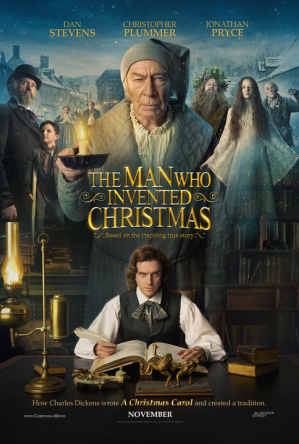Charles Dickens' "A Christmas Carol" is easily the most iconic and adapted Christmas story in history. Instead of simply retelling the classic tale, "The Man Who Invented Christmas" director Bharat Nalluri decided to focus on the author himself and the circumstances that prompted him to create the characters of Ebenezer Scrooge, Tiny Tim, Jacob Marley, and the rest.
"The genius of Dickens was that he kind of invented Christmas on the surface level; Christmas trees and wine and roaring fire and horse chestnuts, it's just a lovely family time," Nalluri told The Gospel Herald at the New York City red carpet premiere for the film. "But in this story there's also a subtext of being good to people around you, really, people who are not as well-off as you. He says in the film, 'No person is useless who lightens the burden of others.' That's the thematic that Dickens gave us."
Based on Les Standiford's 2008 book, The Man Who Invented Christmas: How Charles Dickens's A Christmas Carol Rescued His Career and Revived Our Holiday Spirits, the film follows Dickens through his creative process as he writes "A Christmas Carol" in just six weeks in an attempt to reinvigorate his career after a series of flops. Written in 1843, the book became an overnight sensation, turning the holiday season into the celebration we know today.
"It's a book that we love and treasure in our house and read every Christmas," Dan Stevens (Downton Abbey, Beauty and the Beast), who plays Dickens, told GH. "This book and the idea of this sort of mildly terrifying ghost story - it's brilliant, and it's a really important one to keep alive."
Disturbed by society's disdain of the poor and child labor laws, Dickens wrote the book as a form of social protest, hoping to re-invigorate compassion, empathy, and generosity in the general public.
"There are things that Dickens was seeing in Victorian Britain that were upsetting to him, and that's where this tale started, he had a great deal of anger about that," Stevens said. "But, the general rise of rampant industrial capitalism depressed him a great deal, and he was aware of the social responsibility that comes along with success and power and the pitfalls that can come along with that and what they were and weren't doing about that. He was trying to use his position to help change that."
Despite his disillusionment with society's treatment of the poor, Dickens himself could be irritable, impatient and cheap -- much like the famous Ebenezer Scrooge, brilliantly played by Christopher Plummer. The film examines how the author's troubled childhood, when his father was sent to a debtors' prison and Dickens himself was forced to work in a factory, influenced his work.

Darker elements aside, Stevens pointed out that "A Christmas Carol" is a charming tale of love, giving, and the hope of redemption that is relevant today as it was 150 years ago.
"I hope it does warm people's hearts in some way," he said. "The title is deliberately provocative, because of course, Christmas goes back further than Charles Dickens. But, in the 1840's, Christmas wasn't as widely celebrated as it is today. I think he really saw something in the celebration, or the remembering that the light will return in the very darkest time of the year that really suited this humanist tale he wanted to tell."
He added, "It's about redemption, and the possibility that a bleakly awful character could contain some goodness and maybe do some good around him. So, it was a convenient holiday, as much as anything, but it's incredible how it's bled into our cultural consciousness."
"The Man Who Invented Christmas" opens nationwide on November 22nd. The film is rated PG.







